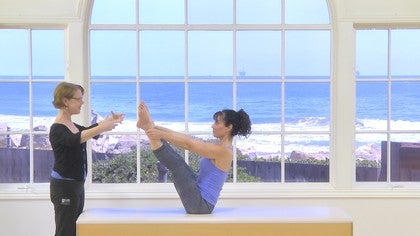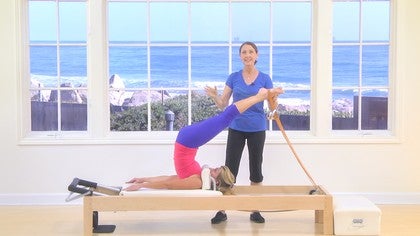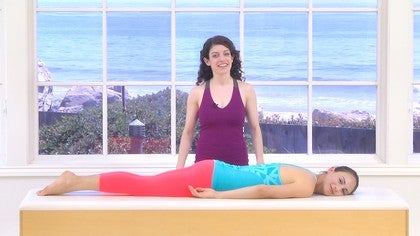Description
About This Video
Transcript
Read Full Transcript
Hi, welcome. We're going to do a little tutorial about the importance of transitions in [inaudible] exercises. I'm Rachel Taylor Segal from the Palabra Center in Boulder, Colorado. I've been teaching for 25 years clients as well as teachers. And so Jennifer and I are gonna work on hoping to help you see how when a transition is done well, but not perfectly, not even right, but done well for the body.
That it will do many valuable things for your body, uh, in preparation for the next exercise in keeping the heat that you're building, uh, alive and continuing and making, uh, you, uh, underst understand how transitions are vital in real life. And most of the times when people make injuries, it's often during transitional moments. So as we teach, as we do and experience, uh, transitions in our plots workout, we are actually preparing our mind and bodies to deal with transitions in real life as well. It helps the breathing, it helps the circulation, it helps all of things that Joe Palabra wrote about and intended his, um, method to provide for the client's body. Transitions are one of those things that we don't think about very much. It's kind of an unbind, um, area. However, I can promise you that if you put a 10th of your interest into the transitions that you put into doing your exercises, well, you will find places you never knew you had.
You will understand movements, uh, inside the exercises better than you might have before. All kinds of gifts are there inside those, inside those transitional moments for you. All right, so we're going to stay here on the mat, but nevertheless, these transitions, the theory of the importance of transitions is carried out throughout Palladia. So wherever you are on whatever piece of equipment, even if there's not a series with official transitions between exercises, you can be thoughtful and stay inside your practice and inside your body as you transition from one thing to another, whether you have to pick up and change springs in equipment or simply move your tush from one end or the mat to the other. Um, the, the transitions we do here are going to set the set up your body to feel, to be more successful sooner. And to get a better, uh, to get your first rep where maybe your fifth rep would have gotten you and thereby you're going to progress faster, build more stamina and endurance, and you're going to feel the um, that wonderful body mind spirit that we are always looking for as a result of practicing PyLadies more readily. Okay. So there's a lot of lot riding on this tutorial, a lot riding on the thoughts of how valuable transitions are.
And if you just start to play a little bit with them, even at home, you'll start to reap some of those benefits that I just talked about. So I'm going to make Jennifer stand up here on the mat and we're going to mount as if beginning the mat work from the beginning into footwork. Now you may not do foot work, you may go in to the hundred and it would serve you there as well. But what's so valuable here is that pilates is full body. So if she presses her arms together and you may choose a different arm position, but whatever it is, it should be valuable and supportive. She presses him together. It comes back here and up into here.
So already her upper body is lifted and not compressing her breath. And now she's going to place one foot in front of the other. I'm going to assist her just a little bit so that on camera she looks great. She's going to keep her back heel down, which is going to stretch her spine and let her breathe better. She's going to pull her tummy really in cause she Musk and then as she rolls back into the footwork, her bellies already bringing those knees to her eyebrows and her shoulders are already strong.
So as she starts out on her first movement, she extends from that Tush and then resist gently bending and stay in there cause exhaling, nicely done. So as that tush takes her out and this is just a further [inaudible] of the squat that brought her, um, down to the mat in the first place. So it should bend the lumbar spine, which it did in the mounting by bringing the knees all the way in, belly working like crazy, but also ham and tush working like crazy. Less time. It comes out from there and if she resists gently, another thought, which you may not want to pay a lot attention to right now, but hold it in the back of your mind is that the moment of transition between out and in is also a transition so that as she starts to bend her knees, she should bend her hips and as she bends her hips, she will be bending everything at the same time, which will turn her tummy on for her more than it might have Jennifer rest good.
Okay, so the mountain from standing up, awful body, all engaged and grounded, make you make use of it. You employ it to arrive on the Mat, not such that you have to wiggle around and get ready, but such that all that movement was valuable for you when as if you were to already started the exercise. Okay, so having done that, we're going to skip around a little bit and we'll say we did the roll up and then how do we get to rolling like a ball? Because that's a very valuable transition that can give you so much power and so much progress. So sometimes we, um, we question our ourselves, our students, our teachers. How can we use the words? Repetitions really implies we don't do reps. What would be the word that we would use that meant every single time you did this thing, it got different. It got more.
So it gave you more than the last time. So I like evolutions, but nevertheless, as she does her transition up, we hope that her first rep is already evolving her movement skills of her body and all the great products that I described at the beginning, such that her second and all the way through to her eighth rep gives her something that she never even expected was possible out of rolling like a ball. So she's going to come curling up into sitting and say, she finished the roll up. So scooch back if you would. Jennifer, her feet were under the strap. She laid down, put her bar down, and now she's ready to do rowing. Lack a ball. I'm going to ask her to put her hands behind her hips, pick up her hips and bring her sits bones all the way to her heels all the way, like all the way, like not even faking it, right? So when she tries to get her sits bones all the way to her heels, notice her lumbar spine is similar to when she mounted down for the foot work.
So now her belly muscles have to be working to bring on arm and then the other arm to her shins, whether she crossed her wrist or not. So she's not perched up on her sitz bones. She is rolled, rounded, low back. She's actually sitting on her sacred. Can we do that one more time quickly? So let me Scooch back all the way straight legs and then tummy and pick your hips up. And here's those hips again, working all the way against and look what that did to her lumbar spine. Then that belly has to bring her arm one after other, eventually both at the same time to her shins and she's in her belly.
So now she doesn't have to work so hard. She inhales to her blades. Keeping the heels close to your Tush. Inhale back. Exhale forward. Now let me hear your exhale. Inhale back. Perfect. In with the air. Good. Keep your heels to your Tush.
Get them closer cause you're imitating a ball after all. And last two times. Inhale. Exhale. Keep them close yours. It's like wild right here at the edge of the mat. One more time. Inhale, hot. Exhale. Nicely done. And then staying where you are with your heels on the mat to scooch back two inches key. Okay, so she arrived. She shouldn't have moved forward, but that's okay.
So she arrived where she finished, but even a tighter ball years between knees so that she has a, so the truly shaped that way. And then to um, take the transition from here. Her is already in her hips. Inner thighs are already working. My crazy. She brings her arms behind her way behind and then picks her hips up. There's those hips again, reaches them behind your wrists and stretches your legs way out in front of you for single leg stretch. So now as she rolls back her spine, which she has already done in a real mat, she's got not only the undulation of her spine that she's already done as a, as a preparatory transitional movement, but she has that squat where the hips are really creased in the lumbars really creased, so tummy and brings one need to the shoulder and she's going to put one wrist, one a hand at the knee, one hand at the ankle, and she's going to bring that in and up. So here's one legged rolling like a ball.
Here's partway down on the mounting for foot work. So as she transitions, we must assume that she's going to use the same muscles that she used in those other two places. So as one leg leaves, it's from the tuition belly and as the other leg is pulled in and creates more tush and belly. And so she switches once and change once and change. Good, go a little faster and feel instead of, well, I don't know about it instead of, but feel the fact, feel yourself replicating the mounting at the beginning. Right? Could you feel the different size you shifted Jennifer.
So it gave her more belly, inner thigh, hamstrings, Tush, which is your powerhouse. And then bring both museum. So here she is enrolling like a ball. So she's already been in ruin like a ball, not only the reps of that exercise and the last exercise but way at the beginning coming down into footwork. She's going to do double leg stretch cause she's going to move from here, which is going to give her abdominal muscles that length. And let's take you down here cause you've been here before. Elbows, two ears.
I'm sorry, up like so like so. And then resist gently as you come in. Right? And the reason I say circle around and bend and pull it to you, nicely done. Do that again. Elbows up by year. Circle around an exhale. So the reason I use the word resist is because I really mean control. Ology, I really mean control it. And the moment of the transition here.
One more time. And this one here. So delay coming in just a hair. And as you do so see the belly drops, the inner thighs work, that Tush works, exhale and rest. Nicely done, Jennifer. All right. So that you can see what you're going to receive out of one rep, let alone a full set of reps in each of the exercises. And so if you're starting to get the transition as part of the exercise, which is part of the transition, et Cetera, then there's no real moments when you stop and gather up again, unless of course you have to because you're tired or you're questioning something. But only if you have to. Otherwise, Joe meant us to continue and continue on so that we built this kind of heat early on. And that's how you make a changes in the body, is with that heat.
So let's look at another little series in the mat work, which is spine stretch forward into open leg rocker into corkscrew. All those gestures. It's like, it's like when you learn how to stir a sauce and they tell you exactly how to stir it so that it completely intermingles and is uniform. So as we combine our transitions with our exercises, we are stirring the sauces on the body. If you'll allow me and therefore receiving more sooner of all the things that Joe hoped Polonius new Polonius would give his practitioners. So Jennifer fuel, come sitting up, open your legs into a v [inaudible] and we'll do a couple spine stretch forwards. So we'll take the arms up, elbows by ears today.
So straight arms up, right. And the reason there are several versions, so don't worry if my version is different than yours, but just look and see what happens. So she inhales here up this whole cylinder of her body. As she exhale, she curls her chin up into her throat, ponytail comes down and over. Elbows stay by ears as best as possible. And you can almost see open like rocker right now, let alone teaser. And uh, all other things that bring that spine like this in relationship to the legs.
As she inhale, she rolls back up and imaginary wall, elbows stay by ears so that she doesn't thrust her body, nor does she sit back and into intuitive lumbar extension. So our sits bones are down, I'm sorry, her heel stays down and she feels her legs like her hips are pressing into her heels and vice versa. And those arms that we had from the very beginning into the shoulders are pressing gently down, engaging here. So the hips pressing here engage for low belly, the arms pulling in, engage her upper belly. She inhales here, she curls over exhaling and rounds her spine, Vertebra by Vertebra, without not, not flexing the hip until she has no more vertebral left to flex. Now how does she bend her elbows?
Not only elbow bend, but shoulder been take her shins in her hand in preparation for open leg rocker. So she is going to pull this together, which pulls this together and then she's going to bend her knees and pull them towards her from here. Right? And here she is in a version of open like rock or I'm running like a ball again. So all those things keep coming up of course. So as she extends her leg, if you remember in single leg stretch, double leg stretch, I said, what if the moment of from straightening to bending the knee, we're also a transition and we paid more attention to it. Bend with control. Good. At the moment of straightening this knee, she's going to be doing something in her hip as well, which gives her tummy. And at the moment of bending, you're going to be bending, which gives her Tammy both legs at the same time.
So hips and exhale bend. Let's try that one more time. Less neck and shoulders cause I have you, but start. Yeah, but think about using your hips before your knees almost since they're are a little elusive. Nicely done. Right? And even at this moment of arrival, if she were to lock her knee in, that transition would not behoove her. But if she keeps her knee lively, then it'll keep her Temi lively and so, and her mind lively. And so she'll be ready to roll back. So at the moment of knee straightening, she hip extends and then arm in shoulder.
Yup. Pulls her tummy. And even more so doesn't take a whole lot of effort, just kinda more thoughtfulness, really. So as she inhales, she's going to roll back to her blades. And as she exhales, she's going to come forward. Nice. So now take your palms to the front of your shins. Push your shins to me away from you. Push them away. Be Brave Rye. Can you feel? Yeah.
Now be brave. I'm here to get you. So as you inhale, you curl your tail a little bit. So you roll every Vertebra and as you exhale, you push to me and you curl your tail and inhale. And as you exhale, you push to me. Good. Now see if you can pull your arms into your shoulders, but push your hands onto your shins. Right? Can you feel the unity and your Torsa? That is gorgeous. So now you can inhale freely. Last time. Exhale forward, right. Bend your knees and rest. Nice.
So every single movement there, um, precedes the next prepares for the next and, uh, allows more product to occur at the next moment. So when she finishes her last open leg rocker in this version. So go ahead and hip and knee straighten at the same timing. Uh, throw that again, hip and knee nicer. Then you bring your legs together, you put your hands on the mat next to your hips. So now we're going to jack knife.
So you roll back over and up and you can see where spine stretch was a preparation for this exercise as she rolls her spine and a neck pull and open like rocker. So she rolls her spine down, her toes stay over her eyes, her tush works like crazy [inaudible] and she feels because of her tush supporting in her thighs as well, she can lower her legs quite far and start them back up. Inhale, curl the tail, never stopping. Lift the legs high through the back. And then if she were to pull her arms up into her shoulders, similarly to from the very beginning of the workout, she's going to have a stronger shoulder girdle from which to release her spine as she rolls down. More articulation, more belly strengthening, right? And exhale
The Successful Beginner: Movement Breakdowns
Comments
our work.
Thank you Rachel and PA
Rachel
would love to see more! One question though - I thought we were going from Spine Stretch Forward to Open Leg Rocker to Corkscrew (not Jackknife). thank you thank you
You need to be a subscriber to post a comment.
Please Log In or Create an Account to start your free trial.


















